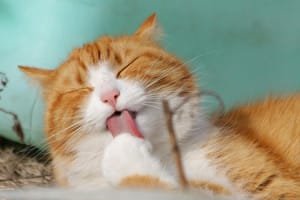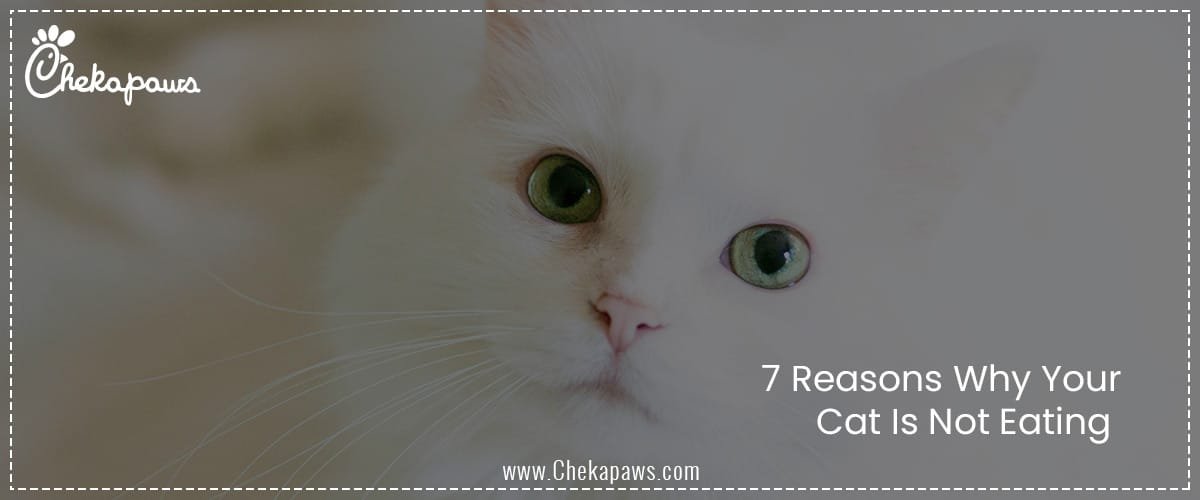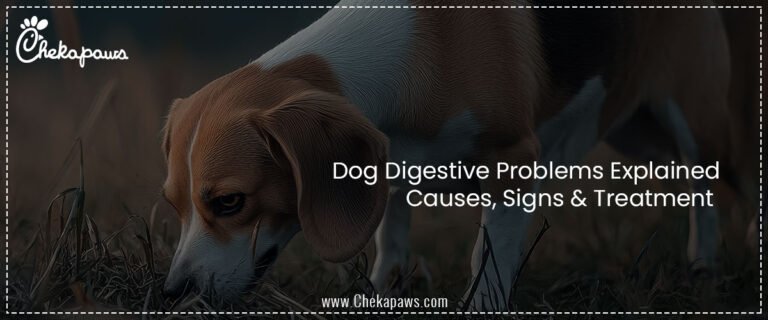As a pet parent, I know that Cats are notoriously finicky eaters. On certain days, they could reject food that they ate only yesterday, leading owners to wonder if this is simply stubbornness or something more severe. Cats cannot survive for extended periods of time without food, unlike dogs. Fasting for even a little time can have negative health effects, such as hepatic lipid overload, a potentially fatal liver disease.
It’s always important to pay attention when a cat abruptly stops eating or gradually loses interest in food. Changes in appetite frequently indicate a physical, emotional, or environmental problem. The first step to helping your cat regain their health and vitality is to understand the causes of their lack of appetite.
Table of Contents

Dental Problems and Oral Pain
Dental illness is one of the most frequent, yet often disregarded, causes of cats ceasing to eat. If you had a terrible toothache and tried to eat your favorite food, you would definitely lose your appetite as well.
Common Dental Issues in Cats
- Tooth Resorption: A painful disorder in which the structure of the tooth deteriorates.
- Gum inflammation brought on by plaque and tartar accumulation is known as gingivitis and periodontal disease.
- Trauma or chewing on hard things might result in broken or fractured teeth.
- Calicivirus and other viral infections are frequently associated with oral ulcers.
Signs of Dental Pain in Cats
- Letting food fall while consuming it.
- Simply using one side of the mouth to chew.
- Pawing at the mouth or face.
- Halitosis, or bad breath.
- Snacking on soft food but refusing to eat dry kibble.
What You Can Do
Arrange for a veterinary examination if you think your pet may have dental issues. Your veterinarian might suggest pain management, tooth extraction, or a dental cleaning while under anesthesia. Until therapy is finished, you can serve soft or moist food at home.
Gastrointestinal Upset
When their intestines or stomach are unhappy, cats frequently refuse food. They may have discomfort, indigestion, or nausea, much as people.
Possible Reasons
- Hairballs: An collection of hair in the stomach may result from over grooming.
- Constipation: Having to strain in the litter box can make you less hungry.
- Gastroenteritis is an inflammation of the digestive tract brought on by parasites, infections, or dietary modifications.
Chronic inflammation that impairs digestion and absorption is known as inflammatory bowel disease (IBD).
Signs to Look Out for
- vomiting undigested food, bile, or foam.
- straining or diarrhoea.
- hiding and sluggishness.
- Weight loss with persistent problems.
Assisting a Cat with GI Discomfort
- Use cat-safe broths or fresh water to keep your feline hydrated.
- Serve bland, little meals frequently (as recommended by a veterinarian).
- Cats are sensitive to numerous medications, therefore never give them human medications.
- If symptoms don’t go away within 24 hours, speak with your veterinarian.
Stress and Environmental Changes
Due to their habitual nature, cats can become unbalanced by minor disturbances. Stress significantly reduces a cat’s appetite.
Common Stress Triggers
- Relocating to a new residence.
- Introducing a new family member or pet.
- Changing feeding places or moving furniture.
- Construction, loud noises, or guests.
- Anxiety related to separation when owners are not around.
How Stress Affects Eating
Stress can cause a “fight or flight” response, which suppresses hunger and changes hormone levels. Bullying or competition over food bowls can also deter eating in multi-cat households.
Remedies for Appetite Loss Caused by Stress
- Maintain a regular feeding schedule.
- Establish safe, peaceful areas for feeding.
- To lessen anxiety, utilize pheromone diffusers, such as Feliway.
- Add toys, hiding places, and scratching posts for enrichment.
Illness or Underlying Medical Conditions
Cats may experience appetite loss due to a variety of medical conditions. Refusing to eat could be the first obvious sign of illness because cats, unlike dogs, are quite good at hiding it.
Potential Situations
- Kidney Disease: Nausea is caused by toxins that accumulate in the blood.
- Liver disease: Impacts energy and digestion.
- Pancreatitis: Inflammation of the pancreas that causes pain.
- Diabetes: Appetite can be impacted by blood sugar fluctuations.
- Respiratory Infections: Cats frequently refuse to eat if they are unable to smell food.
Red Flags to Look For
- Weight loss.
- Increased thirst or urination.
- Breathing difficulties.
- Jaundice (yellowing of skin/eyes).
- Sudden lethargy.
What to Do
See a veterinarian right away if your cat exhibits any symptoms of illness or refuses food for longer than 24 to 48 hours. To identify the issue, X-rays, ultrasounds, or blood work could be required.
Food Preferences and Pickiness
Your cat’s dislike of the food in the bowl can sometimes be the root of the problem. Cats are infamously finicky, and abrupt food rejection may be due to freshness, flavor, or texture.
Food Preference-Influencing Factors
- Texture: While some cats like bits in gravy, others prefer pate.
- Temperature: Cold food straight out of the refrigerator may be rejected by cats.
- Brand or Formula Changes: A cat may be put off by even small recipe changes.
- Stale or Expired Food: Due to their keen sense of smell, cats steer clear of spoilt food.
Tips for Dealing with Picky Eaters
- Food should be slightly warmed to improve smell.
- During transitions, combine new and old foods.
- Switch up your protein sources (turkey, fish, and chicken).
- Steer clear of frequent switching since this could promote fussy behavior.
Aging and Senior Cat Issues
Due to changes brought on by ageing, older cats frequently have decreased appetites.
Common Age-Related Factors
- Reduced ability to taste and smell.
- Dental illness (as already mentioned).
- Slower metabolism and digestion.
- Having arthritis or joint discomfort makes it hard to reach food dishes.
- Having arthritis or joint discomfort makes it hard to reach food dishes.
- illnesses associated with ageing, such as chronic kidney disease or hyperthyroidism.
Supporting Senior Cats
- Serve nutrient-dense, easily digested food.
- To relieve joint discomfort, use elevated or shallow bowls.
- If there are problems with chewing, give them softer food.
- Make time for routine senior wellness examinations.
Medication Side Effects or Recent Vaccination
Your cat may have an unexpected lack of appetite if they recently started taking medicine or received a vaccination.
Medications That May Affect Appetite
- Antibiotics (can cause nausea).
- Pain medications.
- Chemotherapy drugs.
- Steroids (can either increase or decrease appetite depending on type).
Post-Vaccination Reactions
- Mild fever.
- Exhaustion.
- Discomfort at the injection site for a short time.
If your cat continues to avoid food after these effects, which typically last 24 to 48 hours, get in touch with your veterinarian.
When Should You Worry?
Cats should never spend longer than 24 hours without eating. Their bodies aren’t made to fast for extended periods of time. Consult a veterinarian if
- It’s been more than a day since your cat last ate.
- They’re hiding or drooling or vomiting.
- They exhibit symptoms of being dehydrated.
- Weight loss and appetite loss go hand in together.
How to Encourage Your Cat to Eat at Home
- Offer strong-smelling foods (tuna water, sardines, or warmed wet food).
- Try feeding by hand to build comfort.
- Ensure bowls are clean, shallow, and in quiet areas.
- Reduce stressors in the environment.
- Consult your vet about appetite stimulants if necessary.
Conclusion
You should never ignore a cat’s refusal to eat. It can indicate pain, disease, or mental suffering, but it can simply just be pickiness. Quick action is crucial since veterinary care and early discovery can make all the difference.
You’ll be better able to identify issues early, soothe your cat at home, and seek professional assistance when necessary if you know the seven main reasons why cats stop eating. Keep in mind that food is more than just nourishment for cats; it also serves as a gauge of their general well-being.







